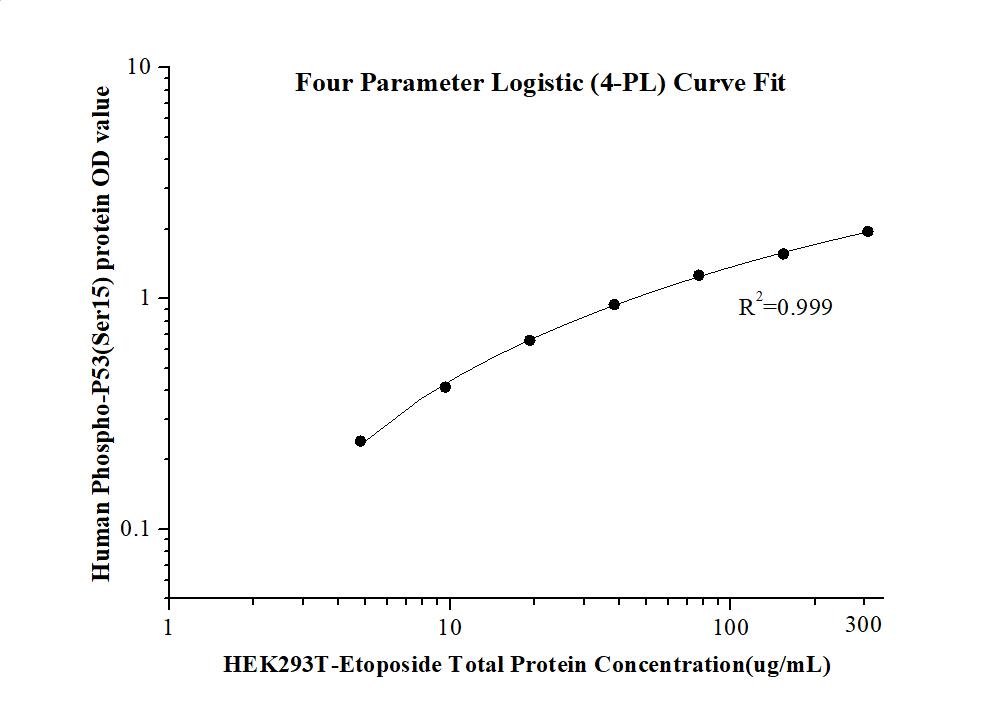Human Phospho-P53 (Ser15) ELISA Kit
Cat no : KE40001
Synonyms
Antigen NY CO 13, Cellular tumor antigen p53, FLJ92943, LFS1, P53, Phosphoprotein p53, TP53, TRP53, tumor protein p53, Tumor suppressor p53
Validation Data Gallery
Product Information
KE40001 is a solid phase sandwich Enzyme Linked-Immuno-Sorbent Assay (Sandwich ELISA). The human Phospho-P53 (Ser15) ELISA kit is to be used to detect and quantify protein levels of endogenous Phospho-P53 (Ser15). The assay recognizes human Phospho-P53 (Ser15). An antibody specific for human P53 has been pre-coated onto the microwells. Phosphorylated sample is captured by the coated antibody after incubation. Following extensive washing, another antibody specific for human Phospho-P53 (Ser15) is added to detect cell Lysate samples. For signal development, horseradish peroxidase (HRP)-conjugated antibody is added, followed by Tetramethyl-benzidine (TMB) reagent. Solution containing sulfuric acid is used to stop color development and the color intensity which is proportional to the quantity of bound protein is measurable at 450 nm with the correction wavelength set at 630 nm.
| Product name | Human Phospho-P53 (Ser15) ELISA Kit |
| Tests | 1 X 96 well plate |
| Sample type | Cell lysates,Tissue Lysate,Tissue Homogenate |
| Assay type | Sandwich |
| Sensitivity | 2.3 ug/mL |
| Range | N/A |
| Reactivity | Human |
| Tested applications | Sandwich ELISA |
| Gene ID (NCBI) | 7157 |
Recovery
| Sample Type | Average | Range |
|---|
IntraAssay
| Sample | n | mean ( ug/mL) | SD | CV% |
|---|---|---|---|---|
| 1 | 20 | 150.0 | 4.9 | 3.3 |
| 2 | 20 | 20.2 | 1.5 | 7.4 |
InterAssay
| Sample | n | mean ( ug/mL) | SD | CV% |
|---|---|---|---|---|
| 1 | 24 | 149.7 | 15.9 | 10.6 |
| 2 | 24 | 19.9 | 2.1 | 10.6 |
Background Information
Stabilized p53 transcriptionally activates genes encoding proteins involved in cell cycle arrest, DNA repair, and/or apoptosis, and represses transcriptional activation of growth-promoting genes. Under physiological conditions, p53, in most cells, is expressed at a low or undetectable level, with a half-life of a few minutes. Under a condition of stress, such as DNA damage caused by ionizing radiation or cytotoxic agents, endogenous p53 is stabilized through a series of physiological responses, including ataxia telangiectasia mutated (ATM)/ATM and Rad3-related (ATR) activation, phosphorylation and acetylation of p53, and weakening of the binding of MDM2 to p53. Phosphorylation of serine 15 also prevents p53 from being exported from the nucleus and stimulates p53 transcriptional activity through the increased association with p300 coactivator.
Properties
| Storage Instructions | All the reagents are stored at 2-8℃ for 6 months or -20℃ for 12 months. Refer to the protocol for further storage instructions. |
| Synonyms | Antigen NY CO 13, Cellular tumor antigen p53, FLJ92943, LFS1, P53, Phosphoprotein p53, TP53, TRP53, tumor protein p53, Tumor suppressor p53 |

